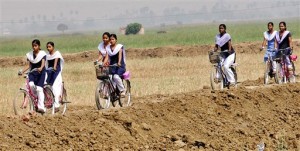Critics say Indian law on teenage sex ‘regressive’

Indian schoolgirls ride bicycles in Bihar state. The Indian parliament approved in May 2012 a new law that if approved by the president raises the age of consent for sex to 18 from 16. Some children’s rights activists are criticizing this as out of step with social changes. AP PHOTO/PRASHANT RAVI
DELHI—India is raising the age of consent for sex to 18 under a new law seen by some children’s rights activists as being out of step with social changes and open to abuse.
Under a provision in the Protection of Children from Sexual Offenses Act approved by parliament last month, sex with a person under the age of 18 will be deemed as statutory rape and subject to prosecution.
Once formally signed into law by the president, the new legislation will supersede a clause in India’s Penal Code that previously set the age of consent at 16 and will carry sentences ranging from three years to life imprisonment.
Critics say the change is open to misuse by police and overprotective parents, puts India at odds with other countries and is further proof of a government run by elderly politicians out of touch with most of the country.
“We can’t pretend children are not sexually active when they are adolescents,” says one senior child welfare official working for a government body who did not want to be named. “This law is plain regressive.”
Article continues after this advertisementThe third National Family Health Survey, the most recent comprehensive government study from 2005 to 2006, states that 43 percent of women aged 20-24 had had sex before they were 18.
Article continues after this advertisementIn rural areas, the high proportion is because of the prevalence of child marriage – more than 47 percent of women aged 20-24 were married by 18 – while in urban areas attitudes on everything from religion to sex are changing.
Surveys from news magazines such as India Today and Outlook find young urban Indians are increasingly open to pre-marital intercourse and more exposed to sex through pornography or steamy films and television shows than ever before.
For Shantha Sinha, the chief of the National Commission for Protection of Child Rights, a state-funded body, the law was open to abuse.
“It can be used to the disadvantage of children if one has to settle scores,” she says, raising the scenario of under-age girls using the law against former partners even if the sex was consensual.
The police may be able to use it to “harass young couples in parks,” Sinha says, while partners who elope – a common occurrence in India where arranged marriages are the norm – could also be targeted.
“You have cases where young people in love elope to escape parental objections and censure. The parents can use this law and make it legally tough for them,” she said.
A trial court judge in New Delhi made the same observation during a hearing in the case of a man accused of kidnapping and raping a girl of 15. The judge acquitted the defendant and ruled the girl had eloped voluntarily.
The change in the law “will open the floodgates for prosecution of boys for offenses of rape on the basis of complaints by girls’ parents irrespective of whether the girl was a consenting party,” noted the judge.
But experts in favor of the change say it will help protect the most vulnerable sections of society, including the millions of girls and young women who work as servants in Indian homes.
Amod Kanth, a former police officer who was part of the drafting process, argues that this consideration must override any other concerns in a country where child abuse is rife.
“We carried out a study in 2007 and found that nearly 53 per cent of children had suffered some kind of sexual abuse,” Kanth told AFP.
“We felt such children needed to be protected and that there should be a specific law for this.
“Tomorrow the same people who are asking for 16 as the legal age of consent will ask for 13,” he added.
The age of consent across the world ranges from 13 to 18, with many countries, including Britain, Norway and Canada setting it at 16, according to Avert, a British charity that works in sexual health.
A few states of the United States, including California, fix the age of consent at 18, but they include a “close-in-age” reprieve for teenagers who have consensual sex.
For Zafar and his friends, who study in a private school in New Delhi, the new law is a fresh example of restrictions imposed on youngsters by “insensitive” adults.
“Most of my friends have already made their sex debut,” said Zafar, 17, who asked to be identified by his first name only.
“Some are in serious relationships, some are doing it for fun, others because they are simply curious.”
The Childline Foundation, a non-profit agency that runs an emergency phone service for children in need of care, says the most important thing is making sex education compulsory in all schools across the country.
“This will help children make informed choices and avoid the pitfalls,” Komal Ganotra, advocacy and training specialist at the Foundation, told AFP.